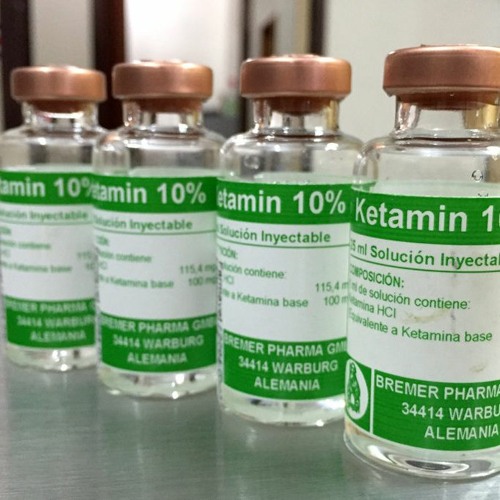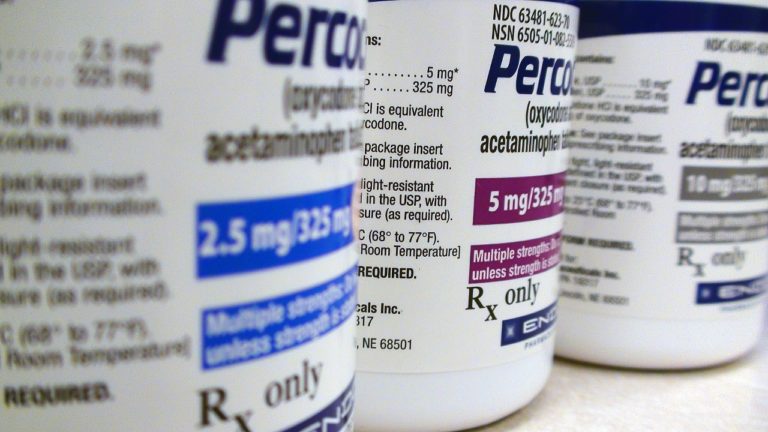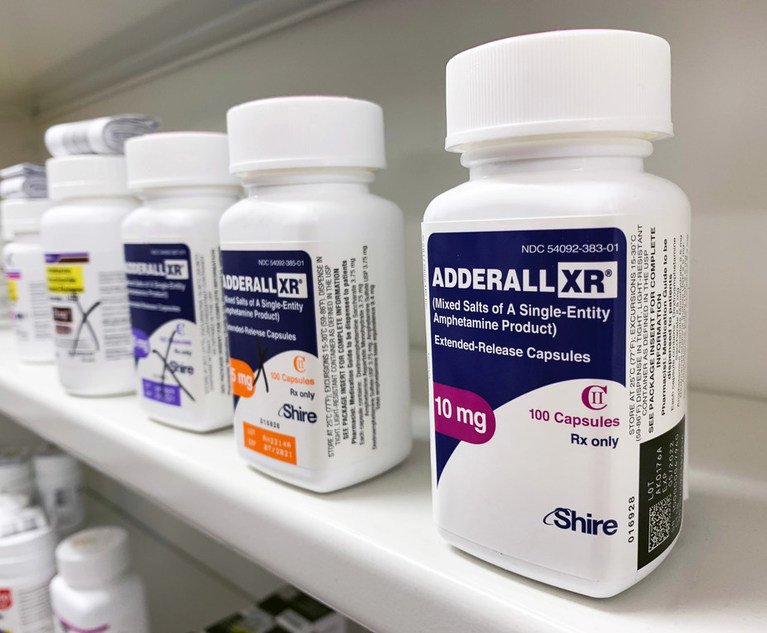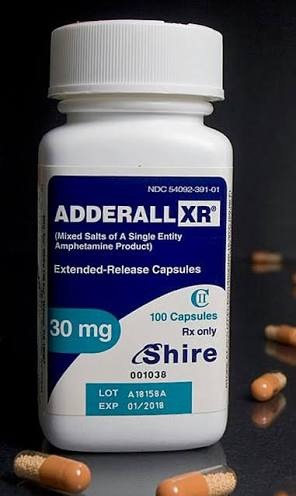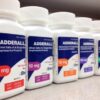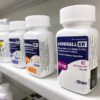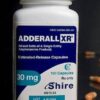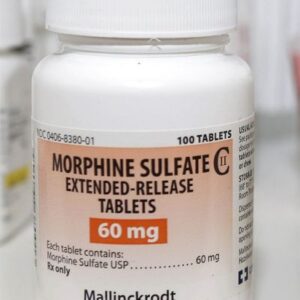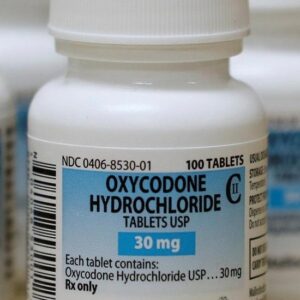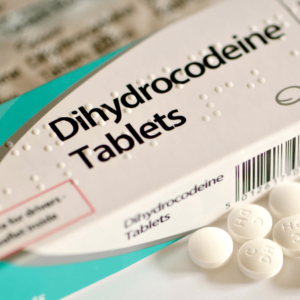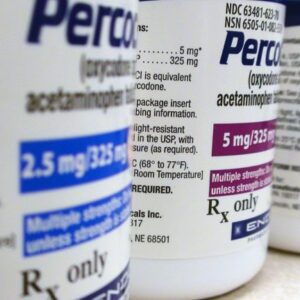Description
Adderall
Adderall is a prescription medicine used to treat the symptoms of hyperactivity and for impulse control. It may be used alone or with other medications. It’s a central nervous system stimulant moreover, i advise you read through carefully to understand how long does Adderall stay in your system.
Taking these medications for long periods can cause psychological and physical dependence. (With dependence, your body needs a drug to function like usual.) This may lead to obtaining Adderall illegally and using it for nonmedical purposes.
Misuse of Adderall may cause serious side effects, including heart problems and death.
What is Adderall?
Adderall is a prescription medication that contains two drugs: amphetamine and dextroamphetamine. It belongs to a class of medications called stimulants. It’s most commonly used to treat attention deficit hyperactivity disorder (ADHD). It’s also used to treat narcolepsy.
Adderall is considered a first-choice treatment option for ADHD. Studies of Adderall and Adderall XR show that the drugs improve attention and focus, and reduce impulsive behaviors. Between 75 percent and 80 percent of trusted Sources of children with ADHD will see improved symptoms with the use of stimulants such as Adderall moreover, read through to understand how long does adderall stay in your system.
Adderall and Adderall XR
Adderall comes in two forms:
- Adderall oral tablet, which is an immediate-release (IR)* form of the drug.
- Adderall XR oral capsule, which is an extended-release (ER)* form of the drug.
Is Adderall a controlled substance?
Yes, Adderall is a controlled substance. This means that it can cause psychological or physical dependence and has the potential for misuse (also called abuse).
These regulations also require that you get a new prescription from your doctor for each refill.
Generic Adderall
Adderall comes in two forms:
- Adderall oral tablet, which is an immediate-release (IR)* form of the drug.
- Adderall XR oral capsule, which is an extended-release (ER)* form of the drug.
Both forms of Adderall are available as generic medications. The generic name for the drug in both the tablet and the capsule is amphetamine/dextroamphetamine salts.
Generic drugs usually cost less than the brand-name version. In some cases, the brand-name drug and the generic version may be available in different forms and strengths. This article focuses on the two brands. Your doctor can provide more information about the availability of the brand-name and generic forms of Adderall.
Adderall ingredients
Adderall contains a mixture of different forms of amphetamine and dextroamphetamine. Specifically, these forms include:
- amphetamine aspartate
- amphetamine sulfate
- dextroamphetamine saccharate
- dextroamphetamine sulfate
Adderall side effects
Adderall can cause mild or serious side effects. The following list contains some of the key side effects that may occur while taking Adderall. This list doesn’t include all possible side effects and how long does Adderall stay in your system.
For more information on the possible side effects of Adderall, or tips on how to deal with a troubling side effect, talk with your doctor or pharmacist.
More common side effects
The more common side effects of Adderall can include:
- lack of appetite
- dry mouth
- trouble sleeping
- headache
- stomach pain
- constipation
- nausea
- weight loss
- anxiety
- dizziness
These side effects may go away within a few days or a couple of weeks. If they’re more severe or don’t go away, talk with your doctor or pharmacist however you can also contact us to understand how long does adderall stay in your system anytime you wish.
Serious side effects
Call your doctor right away if you have serious side effects. Call 911 if your symptoms feel life-threatening or if you think you’re having a medical emergency.
Serious side effects and their symptoms can include the following:
- heart problems, including high blood pressure, rapid heartbeat, heart attack, and stroke
- depression
- hallucinations
- impaired or delusional thinking
- agitated or aggressive behavior
- irritability
- blurred vision
- severe allergic reaction
- muscle breakdown called rhabdomyolysis
Long-term effects
Adderall is safe to use in the long term when taken at doctor-recommended dosages. For many people, common side effects such as loss of appetite, dry mouth, or insomnia are reduced with continued use of the drug. For others, these side effects may continue.
Long-term use of Adderall or other stimulants may cause some changes in the brain, such as decreases in the amount of the chemical messenger dopamine. This seems more likely to happen in people who misuse Adderall in high doses. Inappropriate use can lead to many serious side effects, including:
- severe insomnia (trouble sleeping)
- fatigue
- depression
- skin disorders
- moodiness or irritability
- symptoms of psychosis such as aggression and hallucinations
- heart damage
- anorexia and unwanted weight loss
Adderall high
When taken at typical doses for conditions such as attention deficit hyperactivity disorder (ADHD), Adderall doesn’t usually cause a feeling of being high.
Some people who take Adderall may experience feelings of being energetic, focused, excited, or self-confident. Feelings of euphoria also sometimes occur. For more information, see the “Adderall misuse (also called abuse)” section below.
Headache
Headache is one of the most common side effects of Adderall. In some studies, headaches occurred in up to 26 percent of people who took Adderall XR. This side effect may decrease with continued use of the drug.
Nausea
Nausea is a common side effect of Adderall. In some studies, nausea occurred in 5 percent to 8 percent of people taking Adderall XR. This side effect may decrease with continued use of the drug.
Erectile dysfunction
Most males* who take Adderall don’t experience erectile dysfunction, but some report being less interested in sex. If you experience this side effect and it doesn’t go away, talk with your doctor.
Males who misuse amphetamines such as Adderall can experience erectile dysfunction as well as increases or decreases in sexual desire.
Constipation
Constipation is a common side effect of Adderall. In some studies, constipation occurred in 2 percent to 4 percent of people who took Adderall XR. This side effect may decrease with continued use of the drug.
Hair loss
Some people who take Adderall have reported hair loss. However, it’s not clear how often this occurs or if Adderall was the cause of this effect.
Psychosis
Symptoms of psychosis, including hallucinations, agitation, or disordered thinking, are a rare side effect of Adderall. In some cases, these symptoms have occurred in people taking typical, recommended doses of Adderall.
Symptoms of psychosis are more likely to occur in people who have a history of psychosis before they start taking Adderall. They’re also more common in people who misuse Adderall.
If you have this side effect while taking Adderall, talk with your doctor right away. You may need to stop taking Adderall.
Dry mouth
Adderall XR commonly causes dry mouth in up to 35 percent of people who take it. This side effect may decrease with continued use of the drug.
Sweating
Some people who take Adderall report increased sweating. This seems to occur in about 2 percent to 4 percent of people taking Adderall XR. This side effect may decrease with continued use of the drug.
Insomnia
Insomnia, or trouble sleeping, is one of the most common side effects of Adderall. As much as 27 perent of people who take Adderall XR can have insomnia. This side effect may decrease with continued use of the drug.
Chest pain
People with a healthy heart don’t usually have chest pain while taking Adderall. If you do, it might mean that you have a heart condition.
If you have chest pain after taking Adderall, call your doctor right away.
Fatigue
Fatigue may occur in 2 percent to 4 percent of people who take Adderall XR is commonly prescribed dosages. This side effect may decrease with continued use of the drug.
Fatigue may be more common in people who misuse Adderall, especially in higher doses. Also, people who have become dependent on Adderall can experience extreme fatigue if they stop taking the drug. For more information, see the “Adderall misuse (also called abuse)” section below.
Side effects in children
Some children can have slightly slowed growth in height and weight while taking Adderall. This is usually temporary, and growth typically catches up over time. Your doctor will monitor your child’s growth during treatment with Adderall.
Adderall dosage
The Adderall dosage your doctor prescribes will depend on several factors. These include:
- the type and severity of the condition you’re using Adderall to treat
- your age
- the form of Adderall you take
- other medical conditions you may have
Typically, your doctor will start you on a low dosage and adjust it over time to reach the dosage that’s right for you. They’ll ultimately prescribe the smallest dosage that provides the desired effect.
However, be sure to take the dosage your doctor prescribes for you. Your doctor will determine the best dosage to suit your needs.
Forms and strengths of Adderall and Adderall XR
Adderall comes in these forms and strengths:
- Adderall oral tablet, which is an immediate-release (IR)* form of the drug. Adderall oral tablets are available in the following strengths:
- 5 milligrams (mg)
- 7.5 mg
- 10 mg
- 12.5 mg
- 15 mg
- 20 mg
- 30 mg
- Adderall XR oral capsule, which is an extended-release (ER)* form of the drug. Adderall XR oral capsules are available in the following strengths:
- 5 mg
- 10 mg
- 15 mg
- 20 mg
- 25 mg
- 30 mg
Dosage of Adderall tablet for ADHD
Recommended dosages for Adderall oral tablets to treat ADHD are as follows:
- Adults (ages 18 years and older)
- Typical starting dosage: 5 mg once or twice daily.
- Dosage increases: This dosage may be increased by 5 mg each week until it has the desired effect.
- Note: The first dose of the medication should be taken when you first wake up.
- Children (ages 6 to 17 years)
- Typical starting dosage: 5 mg once or twice daily.
- Dosage increases: This dosage may be increased by 5 mg each week until it has the desired effect.
- Note: The first dose of the medication should be taken when your child first wakes up.
- Children (ages 3 to 5 years)
- Typical starting dosage: 2.5 mg once or twice daily.
- Dosage increases: This dosage may be increased by 2.5 mg each week until it has the desired effect.
- Note: The first dose of the medication should be taken when your child first wakes up.
- Children (ages 0 to 2 years)
- Adderall tablet isn’t recommended for treating ADHD in children under the age of 3 years.
Dosage of Adderall XR capsule for ADHD
Recommended dosages for Adderall XR capsules to treat ADHD are as follows:
- Adults (ages 18 years and older)
- Typical starting dosage: 20 mg once daily.
- Dosage increases: This dosage may be increased or decreased each week until it has the desired effect.
- Note: The medication should be taken when you first wake up.
- Children (ages 13 to 17 years)
- Typical starting dosage: 10 mg once daily.
- Dosage increases: This dosage may be increased to 20 mg once daily after the first week if needed.
- Note: The medication should be taken when your child first wakes up.
- Children (6 to 12 years)
- Typical starting dosage: 5 mg or 10 mg once daily.
- Dosage increases: This dosage may be increased by 5 mg or 10 mg each week until it has the desired effect.
- Note: The medication should be taken when your child first wakes up.
- Children (ages 0 to 5 years)
- Adderall XR isn’t recommended for treating ADHD in children under the age of 6 years.
Dosage for narcolepsy
Adderall oral tablet dosages for narcolepsy are described below.
Dosage of Adderall tablet for narcolepsy
Recommended dosages for Adderall tablets to treat narcolepsy are as follows:
- Adults (18 years and older)
- Typical starting dosage: 10 mg once daily.
- Dosage increases: The dosage may be increased by 10 mg each week until it has the desired effect.
- Note: The first dose of the medication should be taken when you first wake up.
- Children (12 to 17 years)
- Typical starting dosage: 10 mg once daily.
- Dosage increases: The dosage may be increased by 10 mg each week until it has the desired effect.
- Note: The first dose of the medication should be taken when your child first wakes up.
- Children (6 to 11 years)
- Typical starting dosage: 5 mg once daily.
- Dosage increases: The dose may be increased by 5 mg each week until it has the desired effect.
- Note: The first dose of the medication should be taken when your child first wakes up.
- Children (ages 0 to 5 years)
- Adderall tablet isn’t recommended for treating narcolepsy in children under the age of 6 years.
What if I miss a dose?
If you miss a dose in the morning, take it as soon as you can. However, if it’s just a few hours until your next dose, skip the missed dose and take the next one on the schedule. When possible, avoid taking makeup doses in the late afternoon or evening because this can cause problems falling asleep at bedtime.
Never try to catch up by taking two doses at a time. This can cause dangerous side effects.
Will I need to use this drug long-term?
How long does Adderall in your system matters, you might need to use this drug long-term. From time to time during your treatment, your doctor may check whether you need to keep taking it. They’ll do this by tapering you off the medication to see if your symptoms return. If symptoms do return, you may need to keep taking the medication.
Adderall alternatives
There are other drugs available to treat your condition. Talk with your doctor to learn more about other medications that may work well for you.
Alternatives for ADHD
Adderall belongs to a class of medications called stimulants. Drugs in this class are usually considered the first choice of medications for treating ADHD. Other stimulants that are options for treating ADHD include:
- amphetamine (Adzenys XR-ODT, Dyanavel XR, Evekeo)
- dextroamphetamine (Dexedrine, ProCentra, Zenzedi)
- dexmethylphenidate (Focalin, Focalin XR)
- lisdexamfetamine (Vyvanse)
- methamphetamine (Desoxyn)
- methylphenidate (Concerta, Daytrana, Methylin, Metadate CD, Quillivant XR, Ritalin, others)
Some nonstimulant medications are also options for treating ADHD. These include:
- atomoxetine (Strattera)
- bupropion (Wellbutrin XL, Wellbutrin SR)
- desipramine (Norpramin)
- clonidine (Kapvay)
- guanfacine (Intuniv)
- imipramine (Tofranil)
- valproic acid
Some people also use herbs and dietary supplements to treat ADHD. For most of these supplements, there is very little research showing that they work, or research findings are inconsistent. Examples of these supplements include:
- iron
- magnesium
- melatonin
- omega-3 fatty acids such as fish oil
- theanine
- zinc
Be sure to talk with your doctor before trying any herb or dietary supplement for treating ADHD.
Alternatives for narcolepsy
For narcolepsy, there are several other medication options available. These include:
- amphetamine (Evekeo)
- armodafinil (Nuvigil)
- dextroamphetamine (Dexedrine, ProCentra, Zenzedi)
- lisdexamfetamine (Vyvanse)
- methylphenidate (Concerta, Methylin, Ritalin)
- modafinil (Provigil)
- sodium oxybate (Xyrem)
Adderall vs. Vyvanse
Adderall and Vyvanse (lisdexamfetamine) are two medications commonly used to treat ADHD. They’re both stimulants, and they work similarly way. Despite these similarities, there are some differences between the drugs that might make you prefer one over the other.
Use
Adderall is FDA-approved for treating ADHD and narcolepsy. Vyvanse is approved for treating ADHD and binge eating disorders. Vyvanse is also used off-label to treat narcolepsy. It’s not FDA-approved for this purpose, but there is some scientific evidence that it might help.
Adderall uses
The Food and Drug Administration (FDA) approves drugs to treat certain conditions.
Approved uses for Adderall
The FDA has approved Adderall to treat attention deficit hyperactivity disorder (ADHD) and narcolepsy.
Adderall for ADHD/ADD
Both Adderall oral tablets and Adderall XR capsules are FDA-approved for adults and children to treat ADHD. (To learn more about these forms, see the “Adderall dosage” section above.)
Adderall for narcolepsy
Adderall oral tablets are also approved to treat narcolepsy. The drug can help reduce daytime sleepiness in people with this condition.
Off-label uses for Adderall
If you’re taking Adderall without an ADHD or narcolepsy diagnosis, this could be an off-label use.
Depression
Adderall isn’t an antidepressant, but it’s sometimes used off-label to treat depression that doesn’t respond to other treatments.
Some people who take Adderall or similar stimulant medication along with antidepressant medication have improved depression symptoms.
However, taking stimulants with antidepressants can increase the risk of side effects. Talk with your doctor before combining Adderall and any antidepressant medication.
Anxiety
Adderall or similar stimulant medications are sometimes prescribed off-label for people with anxiety, especially for those who have both ADHD and anxiety. Some research suggests that combining stimulant medication with antidepressants might improve symptoms of ADHD and anxiety.
Bipolar disorder
Adderall and other stimulants are sometimes prescribed off-label for treating symptoms of depression in people with bipolar disorder. When used for this purpose, stimulants aren’t usually used by themselves but are combined with other bipolar medications.
Talk with your doctor before combining Adderall with medications used for bipolar disorder.
People may sometimes misuse Adderall without their doctor’s recommendation or prescription. In some cases, this type of misuse of Adderall can lead to taking too much of the drug.
Weight loss
Adderall can cause a loss of appetite. Because of this side effect, some people misuse Adderall as a weight loss aid.
Studying
This occurs especially often with college students.
However, a recent study suggests that for people taking Adderall without ADHD, Adderall doesn’t improve thinking. In addition, it could worsen memory.
Uses in children
To learn more about these forms, see the “Adderall dosage” section above.
Talk with your doctor before stopping this medication. If you stop taking it, the symptoms of your condition may return. You may also develop withdrawal symptoms.
Withdrawal symptoms
If you’ve been taking high doses of this medication and you stop taking it, you may have withdrawal symptoms. These can include:
- tiredness
- fatigue
- depression
People may sometimes misuse Adderall without their doctor’s recommendation or prescription. In some cases, this type of misuse of Adderall can lead to taking too much of the drug.
Weight loss
Adderall can cause a loss of appetite. Because of this side effect, some people misuse Adderall as a weight loss aid.
Studying
This occurs especially often with college students.
However, a recent study suggests that for people taking Adderall without ADHD, Adderall doesn’t improve thinking. In addition, it could worsen memory.
Uses in children
Adderall tablets are approved for treating ADHD in children ages 3 years and older. Adderall tablets are also approved for treating narcolepsy in children ages 6 years and older.
To learn more about these forms, see the “Adderall dosage” section above however, you can read through carefully to understand how long does adderall stay in your system.
Adderall withdrawal
Talk with your doctor before stopping this medication. If you stop taking it, the symptoms of your condition may return. You may also develop withdrawal symptoms.
Withdrawal symptoms
If you’ve been taking high doses of this medication and you stop taking it, you may have withdrawal symptoms. These can include:
- tiredness
- fatigue
- depression
Adderall and alcohol
Consuming alcohol with Adderall can be a dangerous combination for some, especially for those who drink too much. It’s safest to avoid alcohol if you’re taking Adderall.
Drinking alcohol while taking Adderall can make people feel less drunk than they are. This can lead to drinking too much. In addition to other effects, drinking too much may worsen symptoms of attention deficit hyperactivity disorder (ADHD), which Adderall is used to treat.
Consuming alcohol with Adderall can also increase the risk of heart-related side effects, such as:
- hypertension (increased blood pressure)
- rapid heartbeat
- arrhythmia (irregular heartbeat)
Adderall price
As with all medications, the cost of Adderall can vary. To find current prices for Adderall tablets (or Adderall XR capsules) in your area and possible coupons.
The cost you find on GoodRx.com is what you may pay without insurance. The actual price you’ll pay depends on your insurance plan, your location, and the pharmacy you use.
Before approving coverage for Adderall, your insurance company may require you to get prior authorization. This means that your doctor and insurance company will need to communicate about your prescription before the insurance company will cover the drug moreover,try going through to understand how long does adderall stay in your system.
If you’re not sure if you’ll need to get prior authorization for Adderall, contact your insurance company.
Financial and insurance assistance
If you need financial support to pay for Adderall, or if you need help understanding your insurance coverage, help is available.
You can search Medicine Assistance Tool and NeedyMeds to find programs that may help decrease Adderall’s cost. To learn more, visit their websites.
Mail-order pharmacies
Adderall may be available through a mail-order pharmacy. Using this service may help lower the drug’s cost and allow you to get your medication without leaving home. Some Medicare plans may help cover the cost of mail-order medications.
If you don’t have insurance, you can ask your doctor or pharmacist about online pharmacy options.
Generic version
Adderall oral tablet and Adderall XR extended-release oral capsule are both available in generic forms. The generic name for the drug in both the tablet and the capsule is amphetamine/dextroamphetamine salts.
A generic drug is an exact copy of the active drug in a brand-name medication. And generics tend to cost less than brand-name drugs. To find out how the cost of generic amphetamine/dextroamphetamine compares to the cost of Adderall, visit GoodRx.com.
They may have a preference for one version or the other. You’ll also need to check your insurance plan, as it may only cover one or the other.
Overdose
Taking too much Adderall can increase your risk of severe side effects however, read through carefully to understand how long does adderall stay in your system.
Overdose symptoms
Symptoms of overdose can include:
- confusion
- nausea
- vomiting
- diarrhea
- trouble breathing
- high blood pressure
- rapid heartbeat
- stroke
- seizures
- heart attack
In some cases, taking too much Adderall can be fatal furthermore, just read through carefully to understand how long does adderall stay in your system.
What to do in case of overdose
If you think you or your child has taken too much of this drug, call your doctor or seek guidance from the American Association of Poison Control Centers at 800-222-1222 or through their online tool. But if your symptoms are severe, call 911 or go to the nearest emergency room right away(how long does adderall stay in your system)
Overdose treatment
Treatment of overdose will partly depend on the symptoms you have. Medical personnel may give an injection to calm the person however, just read through carefully to understand how long does adderall stay in your system.
How does Adderall work?
Adderall is used to treat attention deficit hyperactivity disorder (ADHD) and narcolepsy. To learn more, see the “Adderall uses” section above.
Each Adderall tablet or capsule contains two stimulant drugs:
- amphetamine
- dextroamphetamine
Both drugs cause the body to release increased norepinephrine and other neurotransmitters in the brain. Neurotransmitters are chemicals that send messages, or signals, between cells.
Increased amounts of these messengers in the brain can result in more focus and attention. In people with ADHD, it can also result in a calming effect. In people with narcolepsy, it helps with alertness and wakefulness how long does adderall stay in your system.
How long does it take to work?
Adderall typically begins to work within one to two hours of taking it.
Adderall half-life
The half-life of Adderall varies depending on a person’s age, liver and kidney function, and other factors. The half-life of Adderall is typically from 9 to 14 hours.
Adderall and pregnancy
However, animal studies don’t always predict the way humans would respond or know exactly how long does adderall stay in your system..
These include an increased risk of being born premature, having low birth weight, or having symptoms of drug withdrawal.
Talk with your doctor if you’re pregnant or planning to become pregnant. Adderall and breastfeeding
You shouldn’t breastfeed while taking this medication. Adderall can pass through breast milk and cause side effects in a child who is breastfed.
Tell your doctor if you’re breastfeeding your child. You may need to decide whether to stop breastfeeding or stop taking this medication however, just read through carefully to understand how long does adderall stay in your system.
Adderall misuse (also called abuse)
Drug dependence can occur in people who take Adderall. Prolonged use can cause both psychological and physical dependence. This can make it difficult to stop taking the medication because your body needs the drug to function like usual.
In some cases, it can lead to drug misuse and inappropriate usage, resulting in severe side effects depending on how long does adderall stay in your system.
Misuse of Adderall is a growing epidemic, especially on college campuses. According to the Substance Abuse and Mental Health Services Administration, an estimated 5.1 million people over the age of 12 misused stimulants in 2018.
Many college students use Adderall to help them study. But some research suggests that Adderall doesn’t improve thinking and might even worsen memory.
Adderall expiration
The purpose of such expiration dates is to guarantee the effectiveness of the medication during this time.
The Food and Drug Administration (FDA) is to avoid using expired medications. However, an FDA study trusted Source showed that many medications may still be good beyond the expiration date listed on the bottle.
If you have unused medication that has gone past the expiration date, talk with your pharmacist about whether you might still be able to use it no mater how long does adderall stay in your system .
Effects of Adderall on the eyes
Adderall can have some effects on your eyes.
Blurred vision
Although rare, blurred vision or trouble focusing can occur in some people who take Adderall.
If you experience blurred vision that doesn’t go away with the continued use of Adderall, talk with your doctor.
Effect on pupils
In some cases, Adderall can temporarily cause your pupils (the black centers of your eyes) to dilate (become bigger). For most people, this isn’t a problem. However, for people with glaucoma, this effect could worsen their condition. People with glaucoma shouldn’t take Adderall.
If you experience any changes in your vision that don’t go away with the continued use of Adderall, talk with your doctor.

